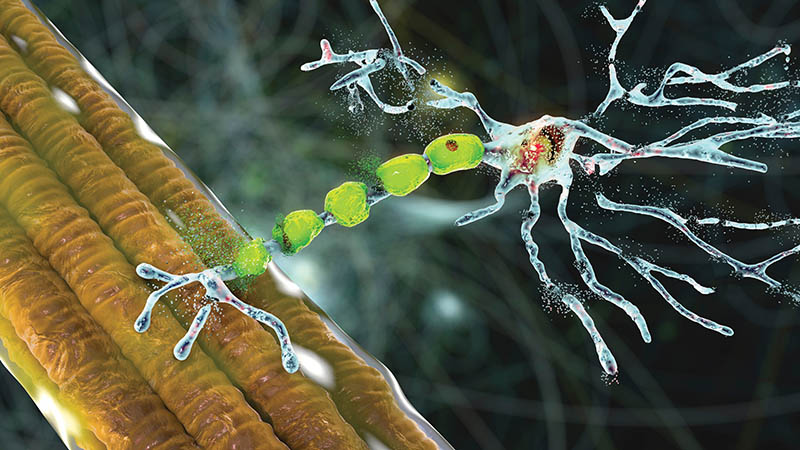An experimental treatment called 3K3A-APC, which was co-developed at Scripps Research and has shown promise against amyotrophic lateral sclerosis (ALS) in preclinical studies, is now being tested in patients with the disease.

Motor neurons (conceptual illustration pictured) may be protected by the 3K3A-APC drug in cases of ALS.
The clinical trial, at Macquarie University in Sydney, Australia, will enroll 16 ALS patients, and aims to provide evidence of the experimental treatment’s safety and effectiveness against ALS (Lou Gehrig’s disease)—a progressive neurodegenerative disease that is usually fatal and has no cure.
Despite decades of intensive research, scientists still have not identified the precise causes of ALS in its most common, non-inherited form, and largely for that reason, there is no Food and Drug Administration (FDA)-approved treatment that markedly improves this condition.
“I’m very hopeful that 3K3A-APC will benefit these patients—in preclinical tests it has displayed remarkable anti-inflammatory, anti-programmed cell death, and other cell- stabilizing activities,” says John Griffin, PhD, a professor in the Department of Molecular Medicine at Scripps Research whose lab invented 3K3A-APC.
Griffin initially developed and studied 3K3A-APC with University of Southern California researcher Berislav Zlokovic, MD, PhD. Zlokovic co-founded Houston-based ZZ Biotech, which has taken 3K3A-APC through advanced preclinical and early clinical development, and which provides it for this ALS trial.
The 3K3A-APC drug is a modified version of a natural human protein, activated protein C (APC), which works as a powerful anticoagulant and has neuroprotective properties. To minimize its chances of causing brain bleeding when used as a treatment, Griffin’s lab altered APC in a way that removes 90 percent of its anticoagulant effect—without removing its other neuroprotective properties.
The trial is a phase 2 open-label trial (NCT05039268) that will assign 16 ALS patients to one of two doses of the treatment. The principal goal is to demonstrate the safety and tolerability of 3K3A-APC in ALS patients, although the results may also provide preliminary evidence that the treatment slows the ALS disease process.